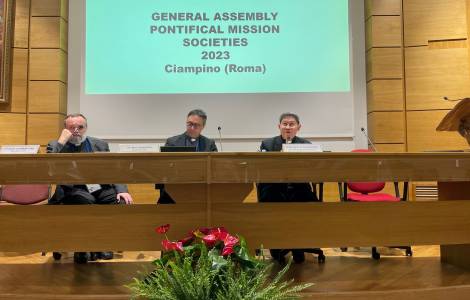
Ciampino (Agenzia Fides) - Every authentic apostolic mission is the work of Christ, who acts by grace and in the lives and hearts of his disciples, thus making himself "perceptible" to others. This was recalled by Cardinal Luis Antonio Gokim Tagle, speaking on Wednesday, May 31 during the first day of the General Assembly of the Pontifical Mission Societies, underway in Ciampino (Rome), at the Institute Madonna del Carmine "Il Carmelo", (see Fides, 30/5/2023).
To the more than 100 national directors of the PMS, from all continents, the Pro-Prefect of the Dicastery for Evangelization proposed in an "off the cuff" speech, three simple points of reflection to accompany the work of the PMS Assembly, drawing inspiration from the Gospel story of the Visitation of Mary to Elizabeth, celebrated as a feast in the liturgy of the day at the close of the Marian month of May.
The Gospel story - the Cardinal underlined - tells of the meeting of two pregnant women who experience two inexplicable pregnancies from a human point of view. Elisabeth is old and "everyone said she was sterile". Mary is a Virgin, and her first words before the Angel who announced her divine pregnancy were: "How is it possible?" How can I be a mother if I do not know a man?
God himself - Cardinal Taglie commented in the first passage of his reflection - intervened in their lives, in view of a mission: "Mary's son has a mission. And Elizabeth's son also has a mission, in view of the mission of Mary's son". The question of "how is it possible" of Mary and Elizabeth starts from the recognition of the impossibility of accomplishing by human capacities what can only be the work of God. A recognition that vibrates in any authentic apostolic work, which is always the work of God carried out "in vessels of clay", as St. Paul recalls in the Second Letter to the Corinthians. "If we have faith, we recognize that the Lord will accomplish what he wants to accomplish in our lives", and that the treasure in the vessels of clay of which Saint Paul speaks is "a treasure which does not come from us". It's not about justifying mediocrity, laziness or lack of creativity. But to recognize that even with the greatest human efforts, we remain limited". A recognition that "has a missionary dimension", because people will only be surprised if they see "in us, with our vessels of clay", "it is God's work, and not ours", which is accomplished. The credit goes to him, the credit goes to God".
Following the thread of the Gospel of the Visitation, Cardinal Tagle confessed to being "fascinated" by the fact that Jesus, still hidden in Mary's womb, was already "perceived" by others, as was the case for Elizabeth and for John the Baptist himself, who "rejoices" in her womb at Mary's arrival. "A still hidden presence was perceived by those who were filled with the Holy Spirit, which allowed them to perceive even what was not visible but present", underlined the Pro-Prefect of the missionary Dicastery. This is a "beautiful mystery" which also relates to the mission of proclaiming the Gospel. The disciples of Christ are called to confess and bear witness to their faith "openly", but there are situations and circumstances in which they carry Christ with them and also bear witness to him in an intimate and silent way, and "those who are close to us", thanks to the action of the Holy Spirit, will be able to "perceive" the presence and the work of Christ in us. This is why missionary work has its source in prayer and in the encounter with Jesus: allowing the Holy Spirit to "form" Christ in us, so that people can feel His presence more than when we walk and do something else", added Cardinal Tagle.
The Visitation - continued the Cardinal, developing the third point of his reflection - is an event of joy: John the Baptist rejoices in Elizabeth's womb, Elizabeth pronounces the words of joy repeated in the Ave Maria, and Mary herself prays with the "beautiful prayer" of the Magnificat, with which she praises the Lord. She "does not draw attention to herself". She is humbled by the joy of recognizing that it is God who "does great things" in her. And her joy immediately becomes communion with the poor and the little ones of the people of Israel. Mary accepts what God is doing in her "as a sign that God will do great things for his people". In what is happening in her, Mary recognizes "the beginning of the fulfillment of the promise". Carrying Jesus in her bosom, she proclaims in communion the liberation of those who suffer. In this way - Cardinal Tagle underlined, recalling in simple words the real reason for any apostolic mission - Mary shows that the grace of God is never only for me, but for everyone. Happiness is authentic only when it is shared". Any mission undertaken in the name of Christ "can never be separated from the encounter with Jesus, from taking Jesus with us and in us", so that it is He who makes Himself "perceptible" for the people we meet, and that the work of God may "shine on every occasion". (GV) (Agenzia Fides, 1/6/2023)